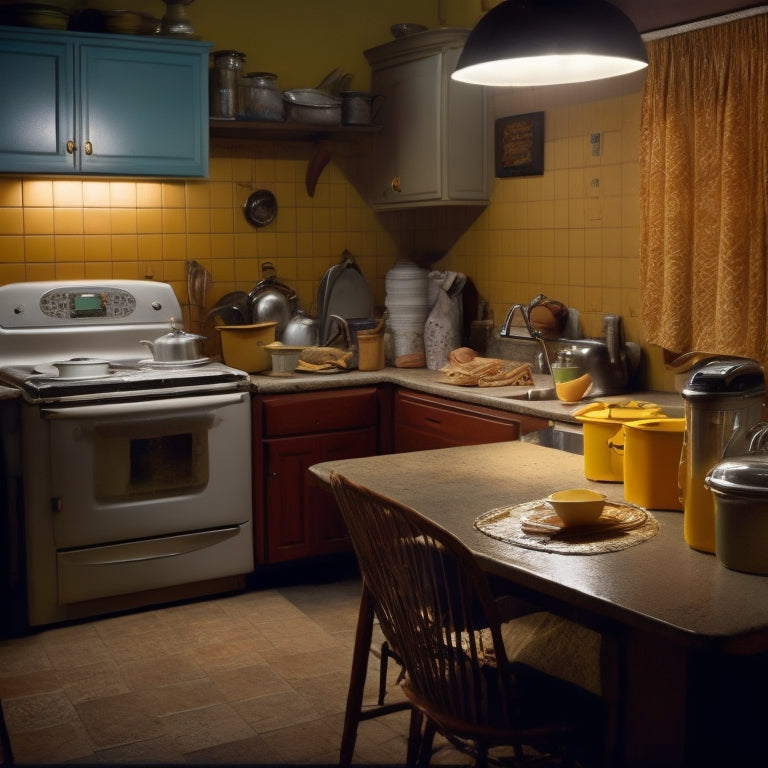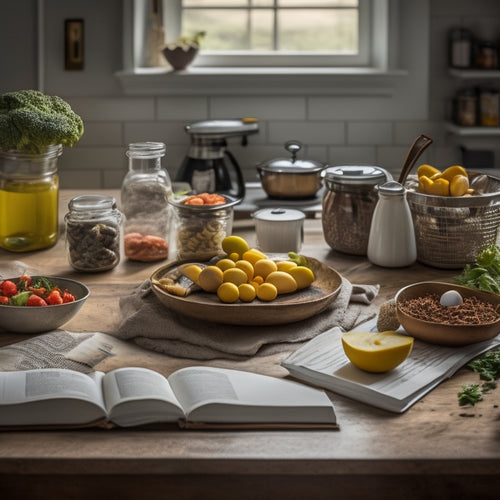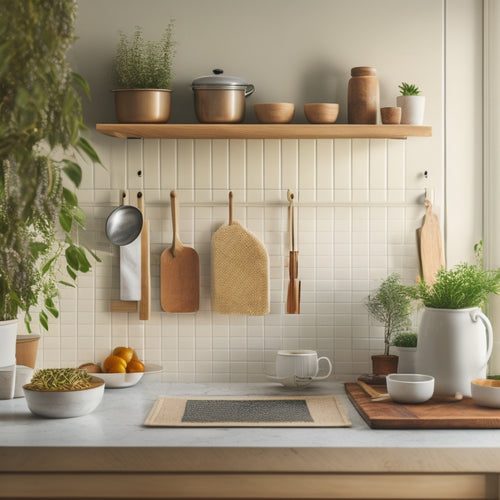
Why Cluttered Kitchens Hold You Back From Sustainability
Share
Your cluttered kitchen is secretly undermining your sustainability goals. The mental fatigue and anxiety caused by visual chaos make it harder to prioritize healthy eating habits and self-care. Clutter wasted nearly 20% of your kitchen space, leading to financial strain, resource depletion, and increased energy consumption. Expired food leads to unnecessary grocery trips, and inefficient appliances worsen your carbon footprint. Disorganization hinders meal planning, leading to overeating and overcooking. You're stuck in a vicious cycle that's hard to break. But by disentangling the mess, you'll open a path to a more sustainable you - and the benefits are just around the corner.
Key Takeaways
• Cluttered kitchens exacerbate anxiety and overwhelm, hindering mental clarity and decision-making essential for sustainable living.
• Inefficient kitchen spaces waste nearly 20% of resources, leading to financial strain, energy consumption, and environmental impact.
• Disorganized kitchens contribute to food waste and spoilage, negating efforts to reduce carbon footprint and live sustainably.
• Clutter hinders efficient meal preparation, leading to overbuying, overcooking, and wasted time, which undermines sustainability goals.
• A cluttered kitchen environment can negatively impact eating habits, body image, and overall well-being, making sustainable living more challenging.
Clutter's Impact on Mental Health
You're no stranger to the feeling of being overwhelmed every time you step into your cluttered kitchen. Living amidst cluttered kitchen spaces can exacerbate feelings of anxiety and overwhelm, as the visual chaos can contribute to a sense of mental fatigue.
The constant visual stimuli can be exhausting, making it difficult for you to focus and think clearly.
Decluttering your kitchen can be a powerful tool for stress reduction. By creating a sense of order and organization, you can reduce feelings of anxiety and overwhelm, allowing you to feel more grounded and in control.
A clutter-free kitchen can also improve your mental clarity, helping you to think more clearly and make better decisions. When your surroundings are organized, you're better able to prioritize tasks and tackle challenges head-on.
Wasting Resources and Money
On average, a cluttered kitchen wastes nearly 20% of its functional space, resulting in unnecessary purchases and a significant drain on your financial resources. This inefficiency leads to financial strain, as you're forced to buy duplicate items or replace lost or broken ones. Additionally, the constant need for new purchases contributes to resource depletion, exacerbating the environmental impact of your kitchen habits.
As you navigate your cluttered kitchen, you're likely to experience inefficiency in every aspect of meal prep. You'll spend more time searching for ingredients, utensils, or cookware, leading to longer cooking times and increased energy consumption. This not only affects your wallet but also the planet.
The environmental impact of your kitchen's inefficiency is substantial, from the energy wasted on extended cooking times to the carbon footprint of excessive packaging and transportation.
Food Waste and Spoilage
With cluttered kitchens, expired or spoiled food often gets pushed to the back of the pantry or fridge, leading to an astonishing amount of waste and unnecessary trips to the grocery store. This not only drains your wallet but also contributes to the staggering 30-40% of food waste in the United States.
You can break this cycle by implementing effective storage solutions and organization techniques. Start by categorizing and grouping similar items, making it easier to identify what you have and what's approaching expiration. Invest in airtight containers and label them, ensuring you can see what's inside.
Meal planning and inventory tracking are also essential in reducing food waste. By planning your meals, you'll only buy what you need, avoiding unnecessary purchases. Keep track of what you have in stock and when it's set to expire, allowing you to use up items before they go bad.
Increased Carbon Footprint
As you rummage through your cluttered kitchen, the energy consumption of your appliances, lighting, and gadgets adds up, contributing to a surprisingly significant carbon footprint. You're not just searching for that one ingredient or utensil; you're also fuelling the production of greenhouse gases.
Every minute you spend searching through the clutter, your kitchen's energy consumption increases, further contributing to the problem.
Here are some alarming facts:
-
A single LED light bulb left on for 24 hours a day can produce up to 70 kg of CO2 per year.
-
The average American kitchen has over 10 appliances, each consuming energy while in standby mode.
-
The energy wasted on inefficient appliances and lighting can account for up to 10% of your household's total energy consumption.
Inefficient Meal Preparation Time
How much time do you waste every day maneuvering your cluttered kitchen to prepare a simple meal, only to realize that precious minutes are slipping away, adding to your overall cooking time and stress levels? You're not alone in this struggle. A cluttered kitchen can be a significant obstacle to efficient meal preparation, and it's not just about the time you're wasting - it's also about the impact it has on your sustainability goals.
When your kitchen is disorganized, you're more likely to spend extra time searching for ingredients, utensils, and cookware, which can lead to frustration and burnout. This inefficiency can also lead to food waste, as you may end up overbuying or overcooking, simply because you can't find what you need when you need it.
Kitchen Safety Risks and Hazards
Disordered kitchens pose a significant threat to your safety, increasing the risk of accidents and injuries from tripping hazards, hot surfaces, and sharp objects. A disorganized kitchen can be a ticking time bomb, waiting to release a catastrophe. You might think it's just a minor inconvenience, but the reality is, cluttered kitchens can be deadly.
Here are just a few examples of the safety risks you're exposing yourself to:
-
Fire hazards: Disordered kitchens are a fire waiting to happen. Grease buildup, exposed wiring, and flammable materials are just a few of the factors that can spark a devastating blaze.
-
Tripping risks: Disordered floors and countertops can lead to slips, trips, and falls, which can result in serious injuries or even fatalities.
-
Sharp objects: A disordered kitchen can hide sharp objects, making it easy to accidentally cut or stab yourself while cooking or cleaning.
Difficulty Maintaining Cleanliness
You struggle to maintain a clean kitchen when countertops and sinks are overrun with dirty dishes, appliances, and utensils, making it difficult to wipe down surfaces and sanitize your cooking space. This cluttered environment hinders your ability to establish effective cleanliness routines, leading to a breeding ground for bacteria and germs.
| Cluttered Kitchen Challenges | Solutions |
|---|---|
| Dirty dishes piling up | Set aside time each day to wash and put away dishes |
| Countertops cluttered with appliances | Designate a specific area for appliances and keep them organized |
| Utensils scattered everywhere | Assign a specific place for utensils and store them properly |
Clutter's Effect on Meal Quality
A cluttered kitchen can compromise the quality of your meals, as overcrowded countertops and disorganized utensils increase the risk of cross-contamination and make it harder to access the ingredients you need. This chaos can stifle your creativity flow, making it challenging to find meal inspiration.
When your cooking space is cluttered, you're more likely to settle for mediocre meals or rely on takeout, rather than experimenting with new recipes.
Here are just a few ways clutter affects meal quality:
-
Limited visibility: Cluttered countertops and shelves make it difficult to see what ingredients you have, leading to forgotten or expired items and reduced meal options.
-
Reduced efficiency: Disorganized utensils and cookware slow down your cooking process, making meal prep a frustrating experience.
-
Increased stress: A cluttered kitchen can be overwhelming, causing you to feel anxious or stressed while cooking, which can negatively impact the overall quality of your meals.
Barriers to Healthy Eating Habits
Sixty-three percent of Americans struggle to maintain healthy eating habits, and a cluttered kitchen is often a significant obstacle in their path. When your kitchen is cluttered, it's challenging to focus on meal planning and organization, making it difficult to prepare nutritious meals. You're more likely to rely on convenient, processed foods or takeout, which can hinder your efforts to eat healthily.
A cluttered kitchen also makes it harder to practice mindful eating and portion control. You're less likely to take the time to savor your food, enjoy the flavors, and stop when you're satisfied. Instead, you might find yourself eating quickly, without paying attention to your hunger cues, and consuming more than you need. This can lead to unhealthy relationships with food and your body.
Frequently Asked Questions
Can a Cluttered Kitchen Affect My Relationships With Family and Friends?
"A million unplanned dinner parties are ruined by cluttered kitchens! You struggle to host social gatherings due to lack of organization, causing unnecessary stress that seeps into your communication with family and friends."
How Does Kitchen Clutter Impact My Ability to Follow a Diet or Meal Plan?
You struggle to follow a diet or meal plan when your kitchen is cluttered, as it hinders food preparation, drains motivation, and amplifies stress, making it harder to stay organized and committed to your healthy eating goals.
Are There Any Specific Clutter Hotspots That Hinder Sustainability the Most?
You step into your kitchen, surrounded by chaos, and wonder where it all goes wrong. The countertops, pantry, and fridge are clutter hotspots that hinder sustainability, leading to food waste and inefficient storage space, making organization a challenging task.
Can a Cluttered Kitchen Increase My Risk of Pest or Rodent Infestations?
You're more likely to attract pests and rodents in a cluttered kitchen, sparking hygiene concerns and structural damage. Uninvited guests can spread health risks and contaminate food, compromising your well-being and kitchen's integrity.
Are There Any Benefits to Decluttering a Kitchen Beyond Sustainability?
You'll find that decluttering your kitchen brings numerous benefits beyond sustainability, including improved mental clarity and efficiency, as well as stress reduction, all thanks to better organization, allowing you to focus on what matters most.
Related Posts
-

Why Keto Dieters Need a Meal Planning System
You need a meal planning system to supercharge your keto diet because without one, you'll be stuck in a vicious cycle...
-

10 Simple Steps to a Clutter-Free Kitchen
You're ready to tackle the chaos in your kitchen! Start by clearing everything off countertops and sorting items into...

